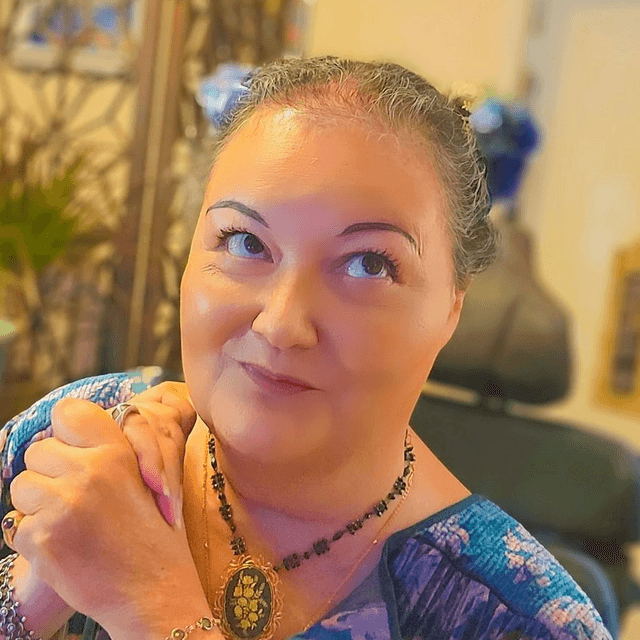Aurora Levins Morales is a Puerto Rican, Ashkenazi Jewish feminist writer, a sentipensante public intellectual, life-long liberationist and movement elder. She has been called a prophetic voice, a visionary, rooted in multiple identities and histories, and drawing forth embodied and accessible writing that is “jam-packed with both theory and poetry.”
Her work has been ground breaking within Latina and Women of Color feminism, Puerto Rican womanist history, Jewish radicalism, Disability and Healing Justice, the deep roots of our ecological emergency, and the inseparability of our causes. A sixth generation radical with more than half a century of social justice work, she brings a similar quality of fierce, hopeful, big-picture thinking and strategic intention to every subject she takes on.
Her lyrical and incisive writing links the intimately personal and the globally systemic, telling stories of stolen histories, deep rooted resistance and inextinguishable hope. Levins Morales reminds us that “To live a lifetime of audacity, dwelling in the place where joy meets justice, year after year, can only be sustained by being so in love with a vision of what’s possible that we no longer flirt with despair.” In poetry and prose, she keeps expanding the field of possibility.
Levins Morales is the author of ten books, most recently The Story of What is Broken is Whole: An Aurora Levins Morales Reader (2024, Duke University Press,) Rimonim: Ritual Poetry of Jewish Liberation (2024, Ayin Press,) and her forthcoming books, A Field Guide to Mistakes, micro-essays about sustainable and effective organizing, and Ferment, about the eco-colonial entanglement of pesticides and epilepsy, and the power of fermentation to heal body and soil.
Her classic 1998 essay collection Medicine Stories was republished in 2019 in a greatly revised and expanded edition by Duke University Press. Other titles include SIlt: Prose Poems, about the power of water as it moves through the the eco-social worlds of the Mississippi River and the Caribbean Sea, Kindling: Writings On the Body, a pioneering Disability Justice collection by a chronically ill, cuir woman of color and colonial subject. Remedios, a wide reaching, complex prose poetry retelling of Atlantic world history through the lives of Puerto Rican women and our kin, and Getting Home Alive and Cosecha and Other Stories, both written with her mother Rosario Morales.
A contributor to earlier groundbreaking anthologies, including This Bridge Called My Back (1981), Telling to Live,: Latina Feminist Testimonios (2002), and Wrestling with Zion: Progressive Jewish-American Responses to the Israeli-Palestinian Conflict (2003), her work has continued to appear in dozens of more recent collections, including Beauty is a Verb: The New Poetry of Disability, and a still untitled anthology on Jewish liberation theology.
The Story of What is Broken is Whole
A reading/discussion of a radical life in art, why art-making matters and how to make good use of it as organizers, with selections from both recent and earlier work, showcasing The Story of What is Broken is Whole: An Aurora Levins Morales Reader. “This collection is not really an anthology. It’s a kind of memoir of a writing life embedded in the social movements of my time.” The Reader, selected and arranged by the author, is curated, not by chroology or genre but “by purpose, by the work each set of words does in the world. Because I am first and foremost a writer of connections, of multiplicities, symbioses and interwoven stories, it would be impossible to sort my writings by subject matter. My themes constantly cross, loop back, tangle together and repeat. This interactive presentation includes extensive Q&A on the range of Levins-Morales’ writing, on Jewish radicalism, Puerto Rican feminist and anti-colonial history, Disability Justice, sustainable activism, ecology, and protecting hope in hard times.
A Field Guide to Mistakes: Building Movements That Are Strong, Sustainable and Kind
The most frequent question Levins Morales hears from younger activists is how to live a sustainable, lifelong, activist life. After that, they ask how to handle the harshness within movement culture, how to be hopeful in the face of the terrible and how to make change that lasts. All these questions are about learning to think strategically rather than reactively, A Field Guide to Mistakes pulls together guiding principles for effective, sustainable and joyful radicalism gleaned from over half a century of active participation in social justice work, and five generations of radical ancestors. “Because we of the many streams of social justice movements have as wide a variety of names for what we’re building as there are hummingbirds in the tropics, this is not a field guide to a destination. It’s a field guide to the kinds of mistakes we hold in common and tend to make again and again along the way, across all the shifting terrain of movement life…A tool for learning to identify the markings of a problem in a movement ecosystem, and find out what is already know about what it is and how to deal with it.
Ecodisability Justice
Levins Morales speaks about disability and chronic illness within the contexts of human ecology, anti-colonialism, radical public health, war and the interwoven movements of feminism, gender and sexuality liberation. Our bodies are part of our ecosystems and suffer the same injuries wrought by greed. Disability Justice is inseparable from ecological justice, part of the same fight to dismantle and replace the extraction ecoomies that are devouring our world. Her first DJ book, Kindling: Writings On the Body (2013) became an instant classic and is still widely taught. In this presentation, she will talk about and read from two forthcoming books, a new multi-genre collection, Rekindling, which digs deeper into human ecology as a Disability Justice framework, and Ferment, a prose poetry and digital art book about the role of pesticides in the global rise of epilepsy, her own “eco-colonial seizure disorder,” and how fermentation works to heal toxicity of body and soil.
Rimonim: Ritual Poetry of Jewish Liberation
Reading and discussion about this new collection of Jewish ritual texts that offer inspiration and courage, rest and rejoicing, grieving, medicine and mobilization.
This long awaited, community supported collection, Rimonim: Ritual Poetry of Jewish Liberation grew directly from communal hunger for a radical Jewish liturgy that allowed progressive Jews to engage with our traditions without sacrificing our deeply held values of justice and truth telling. Her poem “Summons”, written days after Oct 7, 2023, went globally viral and has been translated into multiple languages, set to music in many countries, and been chanted and sung by thousands.




